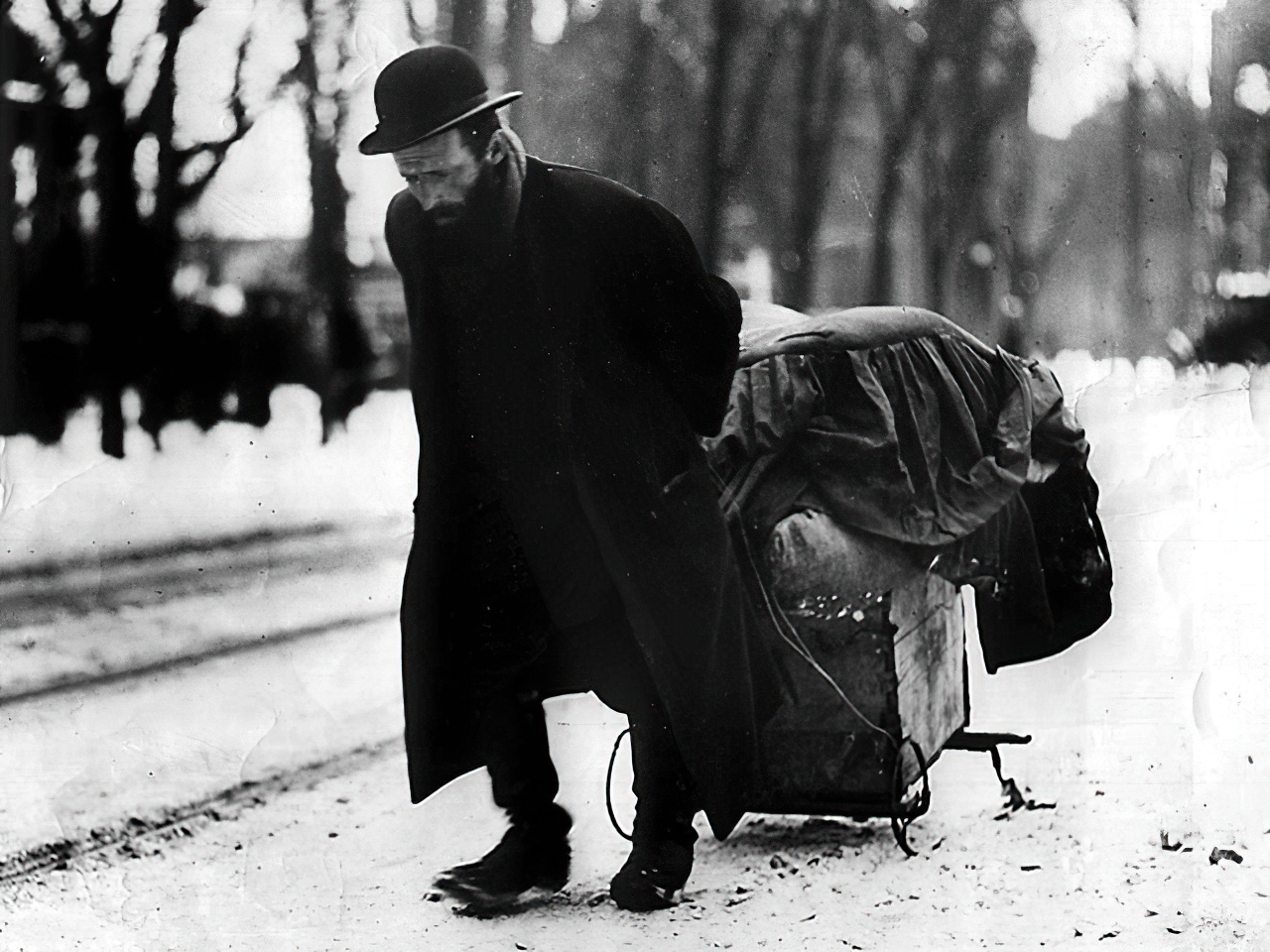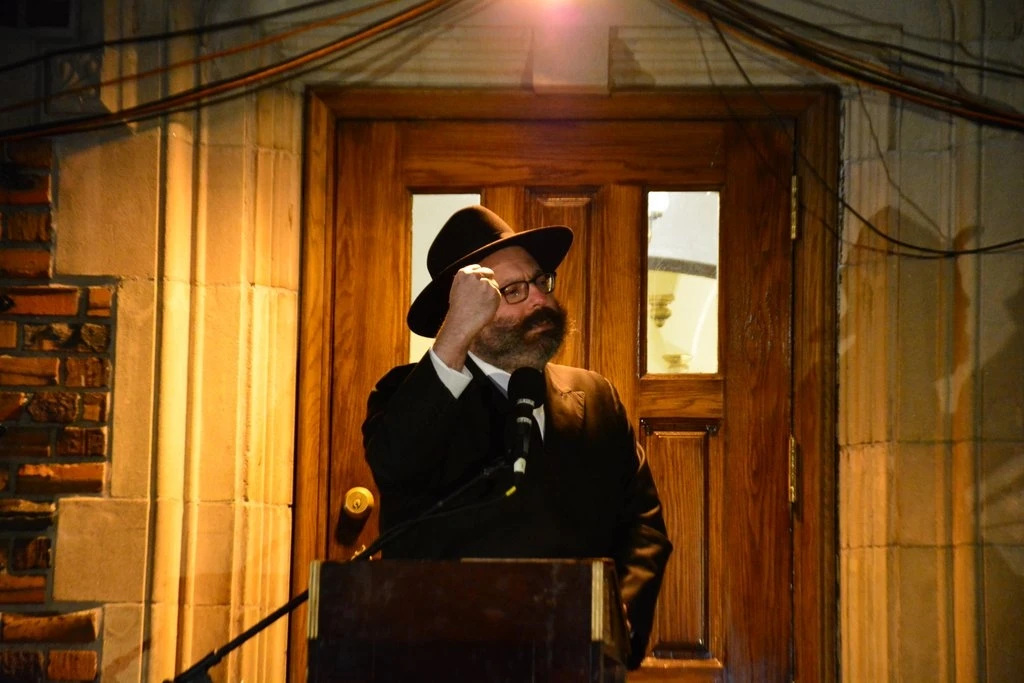Man on the Moon
Every Small Step of a Person Is One Giant Leap for Mankind
- July 19, 2019
- |
- 16 Tamuz 5779
Rabbi YY Jacobson
2401 views
On July 20th, 1969, Neil Armstrong made the first lunar footprint.
Man on the Moon
Every Small Step of a Person Is One Giant Leap for Mankind
Rabbi YY Jacobson
- July 19, 2019
The 50th Anniversary of the Moon Landing
On the morning of July 16, 1969, Neil Armstrong, Buzz Aldrin and Michael Collins lifted off for the moon. Four days later, on July 20th, Mr. Armstrong and Mr. Aldrin set foot on the moon’s surface. Armstrong's first words from the surface of the moon were: "That's one small step for a man, one giant leap for mankind."
Apollo 11 mesmerized the world. According to NASA, 650 million people tuned in to watch the landing 50 years ago. It also changed the way we understood our solar system.
Five decades have passed. The amazement caused by Apollo 11 has not worn off, nor has the vitality and urgency of the lesson below.
The Prelude Mission
Let's go back to the events which preceded the landing on the moon.
On December 21, 1968, seven month before the landing on the moon, man finally – for the first time in history -- broke the bounds of the earth, as three Apollo 8 astronauts, Frank Borman, James A. Lovell and William A. Anders, took the first trip around the moon.
The flight was initially planned as another earth orbiting checkout of the Apollo hardware. But rumors that the Soviets were plotting to beat us into orbit around the moon caused a last-minute change in plans. On December 25, as the world held its breath, the three NASA astronauts conducted ten orbits of the moon and made it back safely to earth, two days later, on December 27.
This space mission served as an important prelude to Neil Armstrong and "Buzz" Aldrin's actual landing on the Moon, seven months later, on July 20, 1969.
Stump The Rabbi
 That very same week, on Thursday, December 26, another far less known event took place, this one in a small studio in New York City. Barry Farber, a popular Jewish radio talk show host (he is today 89; in 2002, industry publication Talkers magazine ranked him the 9th greatest radio talk show host of all time), interviewed Rabbi Zalman Posner, a distinguished rabbi from Nashville. The discussion focused on the Halachik (legal) tradition of Judaism. The symmetry worked well, since Barry Farber is also a Southerner, growing up in North Carolina.
That very same week, on Thursday, December 26, another far less known event took place, this one in a small studio in New York City. Barry Farber, a popular Jewish radio talk show host (he is today 89; in 2002, industry publication Talkers magazine ranked him the 9th greatest radio talk show host of all time), interviewed Rabbi Zalman Posner, a distinguished rabbi from Nashville. The discussion focused on the Halachik (legal) tradition of Judaism. The symmetry worked well, since Barry Farber is also a Southerner, growing up in North Carolina.How does Judaism dare to interfere in the private lives of individual human beings, protested the talk show host. How dare the Torah instruct people, say, what to eat and what not to eat?
What really perturbed Mr. Farber, he said, were the punishments the Torah imposes upon would-be transgressors. According to Jewish law[1], if a Jewish adult willingly consumes food, the volume of an olive, that has been prohibited in the Torah -- pork, lobster, horse meat and the like -- he (or she) is liable to receive thirty-nine lashes[2].
How can one justify such a violation of human rights? Is it anybody's business if I eat a ham sandwich? How can one take such a document seriously? How can you maintain such a book is Divine unless G-d is pernicious?
The Bureaucracy of Penalty
 Rabbi Posner's response on the radio show was that rarely -- if ever -- did a Jewish court have the Torah-right to impose upon a person the penalty of lashes[3]. It was simply almost impossible to ever happen in the real world.
Rabbi Posner's response on the radio show was that rarely -- if ever -- did a Jewish court have the Torah-right to impose upon a person the penalty of lashes[3]. It was simply almost impossible to ever happen in the real world.First, according to Jewish law, lashes can only be administered by a court whose members were ordained by a judge who was, in turn, ordained by a previous judge, and he by a previous judge etc. -- all the way back to Moses, who was "ordained" by G-d at Sinai[4]. Since this form of ordination has ceased more around 1500 years ago[5], no Jewish court since is able to execute the penalty of lashes[6].
Second, even during the times of yore when the courts had this right, the penalty could only be carried out if two witnesses, not related to each other or to the violator, observed the act. A person's own admission would not suffice to penalize him (or her). The two witnesses were scrutinized mercilessly, each one independently, and if the slightest discrepancy was discovered in their testimony, they were invalidated and the victim exonerated.
Third, for a person to receive the lashes, the witnesses were required to warn him prior to his transgression. Not only did they need to warn him not to do the act, but they were also obligated to spell out the punishment he would receive should he proceed to perform the prohibited action. For example, if they observed a Jew about to consume pork, they were required to say to him, "You are prohibited to eat this piece of pork; if you do, you will receive lashes."
Fourth, even after their warning, a person could not become liable to actually receive the lashes, unless he verbally accepted and reiterated the warning. If the violator nodded his head yes, or even stated clearly, "I know exactly what you are saying," and then went ahead to eat the pork, he was exempt of any court penalty. Rather, he needed to respond to the witness warning and say: "I understand what you are saying; I am about to eat this pork knowing that I will receive lashes." Only then can the court ascertain that the violator clearly understood the nature and the consequences of his act, and could thus be held responsible.
Fifth, even after all of this, the violator was still not eligible for punishment unless he began to act within three seconds after the witnesses issued the warning. So, for example, if Harry Goldberg was sitting and enjoying Crab Sushi (the real one), and two witnesses observing warned him that this was forbidden and that if he continued to do so he would be liable for lashes. Harry then reiterated the warning verbally, waited five seconds and continued to eat the crab -- in such a case he would be exempt of any penalty, since we could claim that he might have forgotten the warning.
The obvious implications of this are that it was extremely unlikely for anybody to ever receive lashes. You needed to be a real moron to get yourself lashed by a Jewish court, and if you were a genuine moron you would then be exonerated because of your lack of ability to discriminate between right and wrong.
Furthermore, even if you actually got yourself subjected to the penalty, and you were tied down in court ready to receive the lashes -- if you broke free and ran from the room, Jewish law would not allow the court to return you to the bench. You were free! Where can one find in the history of mankind a judiciary system that functioned in such a fashion?
The Shabbas After
This occurred, as mentioned, on Thursday night, December 26, 1968.
On the following Shabbas afternoon, December 28 (in the Jewish calendar it was Teves 7, 5729), one of the great leaders and sages of our generation, the Lubavitcher Rebbe, Rabbi Menachem Mendel Schnersohn, held an unexpected assembly with thousands of his disciples at his headquarters in Brooklyn, NY. One of the participants was Rabbi Zalman Posner.
The Rebbe began his address by stating that although initially he did not schedule to hold a gathering ("farbrengen") during this Shabbas, the events of the week inspired him to change his plans. Many questions and reflections were evoked in people's minds as a result of the space mission to the moon and the Rebbe said he was compelled to elaborate on them during this Shabbos assembly.
The Lubavitcher Rebbe then turned his attention to the Thursday night radio interview and the exchange between the Rabbi and the radio show host. "Though the answer contained a grain of truth," the Rebbe said, "it did not offer a completely satisfactory answer to the question."
"Let us assume," said the Rebbe, "that in ancient times the Jewish courts administered the penalty of lashes no more than once in a century, due to the tremendous difficulties imposed by the Torah on the execution of the penalty. Granted. But the question still applies to that once in century punishment. How dare the Torah instruct that a person be whipped 39 times just because seconds after a warning by witnesses, he consumed prohibited food? How dare we mix into the private eating habits of an otherwise good and decent human being?
How can we, raised and bred on the ideals of democracy and individual freedom, embrace a value system that would display such lack of tolerance, if even only once in a hundred years? To hurt an innocent human being and say it happens only once in a century doesn't make it less barbaric!
A Mission In Jeopardy
Yet, the Lubavitcher Rebbe went on to explain, if we were to reflect on the major event of the week, NASA's space mission around the moon, we would be far more enlightened.
Before the three astronauts boarded the Apollo, they were instructed how to conduct their daily schedule while on the spacecraft in the most exacting detail. They were told what to wear and how to put on their shoes; what to eat and when to eat; how to sit, how to move around, how to sleep, even how to tend to their bodily needs. Almost every part of their behavior, from the most external to the most intimate, needed to conform to the meticulous instructions outlined by the space experts.
Imagine if during mid flight one of the astronauts would decide to take things into his own hand and, say, light up a cigarette to enjoy a smoke? He would naturally be rebuked and penalized harshly. Is that fair? As an individual is he not entitled to make his own choices and light up a cigarette when he feels like it?
This is obviously a foolish observation. If you were igniting a cigarette, or eating the wrong food, in the privacy of your own home or on a street corner, that would be your business. But when you ignite a flame, or deviate in some other way from the prescribed rules of conduct, amid a mission in outer space, this cannot to be seen as an isolated act, affecting merely one individual’s life. Rather, we must view this act in its proper context. A seemingly insignificant aberration of a few rules is placing three lives in danger; it is sending a multi billion-dollar investment to the garbage dump and is lying waste decades of sweat, toil and energy by a mind staggering number of scientists and engineers in the preparation of the mission. Finally, this little deviation of the rules may destroy, in a single moment, the dreams and hopes of an entire country, perhaps an entire world!
It has taken almost $24 billion to give Neil Armstrong a chance to walk on the moon for two hours, 40 minutes. The Apollo mission was the culmination of decades of work by an estimated 400,000 people working across dozens of science, technology, and engineering disciplines. All of this would be lost.
For such chutzpah and selfishness you ought indeed to be penalized severely. If you are ready to destroy three human lives; a multi-billion-dollar investment; the tremendous labor of hundreds of thousands of men and women for decades long; if you are prepared to kill a mission eagerly anticipated by the entire world, and why? Just so that you can fulfill a selfish craving to smoke a cigarette -- this is a demonstration of incredible inhumanness, apathy and narcissism.
The Voyage of Human History
Though far less obvious, this is true about our lives as well.
The history of mankind is a single, harmonious voyage, extending from the beginning of creation till the end of time. All of us have been chosen and placed together on a little planet suspended, just like the space shuttle, in mid air, and have been charged with the task of generating a kiss between heaven and earth. Together, all of us living on the planet travel a long, and challenging journey through space and time, assigned with a mission to sanctify the world and turn it into a beautiful and harmonious abode for goodness, love and holiness.
Each and every individual who ever lived -- and will ever live -- is indispensable to the journey of our planet toward redemption. History is a grand play and you must contribute your verse. The human story is a composition in which each of us contributes our notes. If your notes are lacking, history remains flawed and wanting. Your contribution is absolutely necessary. You are indispensable to G-d's vision of the world, chosen to fulfill a mission that you and only you can accomplish through your thoughts, words and actions, on a daily basis.
Our sages put it thus[7]: "The first human being (Adam) was created alone" (without any other men) in order to teach us, that "Each and every one is obligated to say, 'For my sake was the world created.'" This is not about arrogance. It means that you must assess your value as though you were the only human being in existence. This is not drama, it is actually true, because there is something at stake in your life, in your daily moral choices, which affects the entire planet and the entire cosmos -- past, present and future.
Just as in the space shuttle, one wrong move by a single astronaut can derail the mission, so it is with the “space mission” granted to humanity the day our planet was formed and commenced its journey. Each and every individual plays an indispensible role in bringing our mission to its completion.
How Selfish Can I Be?
The Torah is the manual given to the “astronauts” for their grand mission; it is the Divine blueprint that guides the human being on how to achieve his or her mission of transforming the psyche and the world.
When the Torah tells the Jew not to eat certain foods, should he or she go ahead and eat them, it is not to be seen as an isolated act, affecting merely his own abdomen. If you see yourself in the proper context, you will recognize that your acts generate vibrations throughout the entire cosmos, and impacts the destiny of the entire "spacecraft" and all of history. In this case, repair is possible; but nothing will ever be the same. You are too grand a player to live a mediocre life and dismiss your behaviors as trivial.
When I choose to eat something non-kosher, or to commit another act that is antithetical to the G-dly vision for the Jew articulated in the Torah manual, I am not only abusing my own spiritual and physical self; I am hurting, even if unconsciously, thousands of years of blood and tears of millions of women and men who sacrificed their lives to lead the world on its journey toward peace and redemption. For the mission of creation to be fulfilled, my participation is critical. When I choose to reject the Divine rules for our mission in "space," I am derailing the “space shuttle” from its course, and threatening to plunge the mission into the abyss.

Apollo 11 boot print on the Moon. July 20, 1969.Now, if within seconds after hearing and accepting a clear-cut warning by witnesses as to the nature of your forbidden act, you still go ahead to eat your bacon or shrimp, knowing that by committing this act you are laying waste to thousands of years of human love and blood; knowing that you are hurting the dream and the hope of all of history, so that you should be able to fulfill a selfish craving to eat non-kosher steak instead of kosher steak, such a display of inhumanity warrants indeed 39 whips. In fact, you might even ask: Only 39 whips?
(I thought that this may be the deeper reason for the fact that all of these penalties have ceased from Jewish life over the last two miilenia. Since as the generations progressed, it became increasingly difficult to feel how our individual acts may affect the entire universe, our violations of Torah laws do not bespeak narcissism as much as they express ignorance. Thus, the punishments of old have become inappropriate.)
The Little A
The journey to the moon, then, was not only about ”one small step for a man, one giant leap for mankind." It taught us something even more critical: each step of every person, at every moment, is a giant leap for mankind. The question is in which direction.
Only you and I, and all of us together, can provide the answer.[8]
[1] Rambam Hilchos Maacholos Asuros chapter 2.
[2] For the sake of accuracy I should note that Mr. Farber kept on referring to the number of 38 lashes. This was, obviously, an error. The correct number is 39, see Talmud Makos p. 22; Rambam Hilchos Sanhedrin 17:1.
[3] The five points outlined below are all discussed in Rambam Hilchos Sanhedrin 16:1-4; 12:13; Hilchos Eidus chapters 1-2; 3:2 and Talmudic references noted in the commentaries.
The Talmud goes so far as to compare the punishment of whipping a human being to killing him! (Sanhedrin 10a; Rambam Hilchos Sanhedrin 16:1). Thus, all of the extraordinary procedures required to impose the death penalty, were required prior to the lashes penalty as well (Rambam ibid. 16:1; 4; 11:4).
According to Rabbi Ishmael, a court of 23 members was required to impose lashes, the same amount required to issue a death sentence (Talmud Yerushalmi Sanhedrin 1:2; Cf. Tosefos Sanhedrin 10a.) However, the established verdict is that a court of three suffices (Sanhedrin ibid. Rambam Hilchos Sanhedrin 5:4; 16:2.)
[4] The nature of this unique ordination is discussed in Rambam Hilchos Sanhedrin chapter 4.
[5] It is interesting to note that in the 1500's, one of the well known sages in the Holy Land, Mahari Bei Rav, attempted to renew this type of ordination in Jewish life. He wished to establish Jewish courts whose members would enjoy the status of "Musmachim," fully ordained rabbis (this attempt was based on an innovative ruling by the Rambam Hilchos Sanhedrin 4: 11.) His plan was counterattacked by many a leading sage of the time and never came to full fruition. (For a full discussion of the event, see Kuntres Hasmicah at the end of Shaalos Utshuvos Maharlbach.)
[6] In a similar vein, the possibility of Jewish courts imposing death penalties ceased around 1995 years ago. For a Jewish court to impose the death penalty there must be a Temple (Beis Hamikdash) existing in Jerusalem, and the Jewish Supreme Court numbering 71 members must be established near the Temple. Since this condition did not exist forty years before the destruction of the second temple, the death penalty was abolished from the Judaic Judicial system (Rambam Hilchos Sanhedrin 14:11-13).
[7] Mishnah Sanhedrin 37a.
[8] I interviewed Rabbi Zalman Posner back in 2009, who shared with me all the details of the story. (He passed away in 2014). The dialogue between Barry Farber and Rabbi Posner was not quoted verbatim in the essay from the radio transcript. For the address of the Lubavitcher Rebbe, I used the Yiddish unedited transcript written at the time (Sichos Kodesh 5729 vol. 1), and the memory of Rabbi Posner who was present.- Comment
Class Summary:
Every Small Step of a Person Is One Giant Leap for Mankind
Dedicated by Eda and David Schottenstein, in honor of his parents Tuvia and Lea Schottenstein. Dedicated in the loving memory of Leah Sarah bas Shraga Feivish
In honor for her Yartzeit, 11 Menachem Av
The 50th Anniversary of the Moon Landing
On the morning of July 16, 1969, Neil Armstrong, Buzz Aldrin and Michael Collins lifted off for the moon. Four days later, on July 20th, Mr. Armstrong and Mr. Aldrin set foot on the moon’s surface. Armstrong's first words from the surface of the moon were: "That's one small step for a man, one giant leap for mankind."
Apollo 11 mesmerized the world. According to NASA, 650 million people tuned in to watch the landing 50 years ago. It also changed the way we understood our solar system.
Five decades have passed. The amazement caused by Apollo 11 has not worn off, nor has the vitality and urgency of the lesson below.
The Prelude Mission
Let's go back to the events which preceded the landing on the moon.
On December 21, 1968, seven month before the landing on the moon, man finally – for the first time in history -- broke the bounds of the earth, as three Apollo 8 astronauts, Frank Borman, James A. Lovell and William A. Anders, took the first trip around the moon.
The flight was initially planned as another earth orbiting checkout of the Apollo hardware. But rumors that the Soviets were plotting to beat us into orbit around the moon caused a last-minute change in plans. On December 25, as the world held its breath, the three NASA astronauts conducted ten orbits of the moon and made it back safely to earth, two days later, on December 27.
This space mission served as an important prelude to Neil Armstrong and "Buzz" Aldrin's actual landing on the Moon, seven months later, on July 20, 1969.
Stump The Rabbi
 That very same week, on Thursday, December 26, another far less known event took place, this one in a small studio in New York City. Barry Farber, a popular Jewish radio talk show host (he is today 89; in 2002, industry publication Talkers magazine ranked him the 9th greatest radio talk show host of all time), interviewed Rabbi Zalman Posner, a distinguished rabbi from Nashville. The discussion focused on the Halachik (legal) tradition of Judaism. The symmetry worked well, since Barry Farber is also a Southerner, growing up in North Carolina.
That very same week, on Thursday, December 26, another far less known event took place, this one in a small studio in New York City. Barry Farber, a popular Jewish radio talk show host (he is today 89; in 2002, industry publication Talkers magazine ranked him the 9th greatest radio talk show host of all time), interviewed Rabbi Zalman Posner, a distinguished rabbi from Nashville. The discussion focused on the Halachik (legal) tradition of Judaism. The symmetry worked well, since Barry Farber is also a Southerner, growing up in North Carolina.
How does Judaism dare to interfere in the private lives of individual human beings, protested the talk show host. How dare the Torah instruct people, say, what to eat and what not to eat?
What really perturbed Mr. Farber, he said, were the punishments the Torah imposes upon would-be transgressors. According to Jewish law[1], if a Jewish adult willingly consumes food, the volume of an olive, that has been prohibited in the Torah -- pork, lobster, horse meat and the like -- he (or she) is liable to receive thirty-nine lashes[2].
How can one justify such a violation of human rights? Is it anybody's business if I eat a ham sandwich? How can one take such a document seriously? How can you maintain such a book is Divine unless G-d is pernicious?
The Bureaucracy of Penalty
 Rabbi Posner's response on the radio show was that rarely -- if ever -- did a Jewish court have the Torah-right to impose upon a person the penalty of lashes[3]. It was simply almost impossible to ever happen in the real world.
Rabbi Posner's response on the radio show was that rarely -- if ever -- did a Jewish court have the Torah-right to impose upon a person the penalty of lashes[3]. It was simply almost impossible to ever happen in the real world.
First, according to Jewish law, lashes can only be administered by a court whose members were ordained by a judge who was, in turn, ordained by a previous judge, and he by a previous judge etc. -- all the way back to Moses, who was "ordained" by G-d at Sinai[4]. Since this form of ordination has ceased more around 1500 years ago[5], no Jewish court since is able to execute the penalty of lashes[6].
Second, even during the times of yore when the courts had this right, the penalty could only be carried out if two witnesses, not related to each other or to the violator, observed the act. A person's own admission would not suffice to penalize him (or her). The two witnesses were scrutinized mercilessly, each one independently, and if the slightest discrepancy was discovered in their testimony, they were invalidated and the victim exonerated.
Third, for a person to receive the lashes, the witnesses were required to warn him prior to his transgression. Not only did they need to warn him not to do the act, but they were also obligated to spell out the punishment he would receive should he proceed to perform the prohibited action. For example, if they observed a Jew about to consume pork, they were required to say to him, "You are prohibited to eat this piece of pork; if you do, you will receive lashes."
Fourth, even after their warning, a person could not become liable to actually receive the lashes, unless he verbally accepted and reiterated the warning. If the violator nodded his head yes, or even stated clearly, "I know exactly what you are saying," and then went ahead to eat the pork, he was exempt of any court penalty. Rather, he needed to respond to the witness warning and say: "I understand what you are saying; I am about to eat this pork knowing that I will receive lashes." Only then can the court ascertain that the violator clearly understood the nature and the consequences of his act, and could thus be held responsible.
Fifth, even after all of this, the violator was still not eligible for punishment unless he began to act within three seconds after the witnesses issued the warning. So, for example, if Harry Goldberg was sitting and enjoying Crab Sushi (the real one), and two witnesses observing warned him that this was forbidden and that if he continued to do so he would be liable for lashes. Harry then reiterated the warning verbally, waited five seconds and continued to eat the crab -- in such a case he would be exempt of any penalty, since we could claim that he might have forgotten the warning.
The obvious implications of this are that it was extremely unlikely for anybody to ever receive lashes. You needed to be a real moron to get yourself lashed by a Jewish court, and if you were a genuine moron you would then be exonerated because of your lack of ability to discriminate between right and wrong.
Furthermore, even if you actually got yourself subjected to the penalty, and you were tied down in court ready to receive the lashes -- if you broke free and ran from the room, Jewish law would not allow the court to return you to the bench. You were free! Where can one find in the history of mankind a judiciary system that functioned in such a fashion?
The Shabbas After
This occurred, as mentioned, on Thursday night, December 26, 1968.
On the following Shabbas afternoon, December 28 (in the Jewish calendar it was Teves 7, 5729), one of the great leaders and sages of our generation, the Lubavitcher Rebbe, Rabbi Menachem Mendel Schnersohn, held an unexpected assembly with thousands of his disciples at his headquarters in Brooklyn, NY. One of the participants was Rabbi Zalman Posner.
The Rebbe began his address by stating that although initially he did not schedule to hold a gathering ("farbrengen") during this Shabbas, the events of the week inspired him to change his plans. Many questions and reflections were evoked in people's minds as a result of the space mission to the moon and the Rebbe said he was compelled to elaborate on them during this Shabbos assembly.
The Lubavitcher Rebbe then turned his attention to the Thursday night radio interview and the exchange between the Rabbi and the radio show host. "Though the answer contained a grain of truth," the Rebbe said, "it did not offer a completely satisfactory answer to the question."
"Let us assume," said the Rebbe, "that in ancient times the Jewish courts administered the penalty of lashes no more than once in a century, due to the tremendous difficulties imposed by the Torah on the execution of the penalty. Granted. But the question still applies to that once in century punishment. How dare the Torah instruct that a person be whipped 39 times just because seconds after a warning by witnesses, he consumed prohibited food? How dare we mix into the private eating habits of an otherwise good and decent human being?
How can we, raised and bred on the ideals of democracy and individual freedom, embrace a value system that would display such lack of tolerance, if even only once in a hundred years? To hurt an innocent human being and say it happens only once in a century doesn't make it less barbaric!
A Mission In Jeopardy
Yet, the Lubavitcher Rebbe went on to explain, if we were to reflect on the major event of the week, NASA's space mission around the moon, we would be far more enlightened.
Before the three astronauts boarded the Apollo, they were instructed how to conduct their daily schedule while on the spacecraft in the most exacting detail. They were told what to wear and how to put on their shoes; what to eat and when to eat; how to sit, how to move around, how to sleep, even how to tend to their bodily needs. Almost every part of their behavior, from the most external to the most intimate, needed to conform to the meticulous instructions outlined by the space experts.
Imagine if during mid flight one of the astronauts would decide to take things into his own hand and, say, light up a cigarette to enjoy a smoke? He would naturally be rebuked and penalized harshly. Is that fair? As an individual is he not entitled to make his own choices and light up a cigarette when he feels like it?
This is obviously a foolish observation. If you were igniting a cigarette, or eating the wrong food, in the privacy of your own home or on a street corner, that would be your business. But when you ignite a flame, or deviate in some other way from the prescribed rules of conduct, amid a mission in outer space, this cannot to be seen as an isolated act, affecting merely one individual’s life. Rather, we must view this act in its proper context. A seemingly insignificant aberration of a few rules is placing three lives in danger; it is sending a multi billion-dollar investment to the garbage dump and is lying waste decades of sweat, toil and energy by a mind staggering number of scientists and engineers in the preparation of the mission. Finally, this little deviation of the rules may destroy, in a single moment, the dreams and hopes of an entire country, perhaps an entire world!
It has taken almost $24 billion to give Neil Armstrong a chance to walk on the moon for two hours, 40 minutes. The Apollo mission was the culmination of decades of work by an estimated 400,000 people working across dozens of science, technology, and engineering disciplines. All of this would be lost.
For such chutzpah and selfishness you ought indeed to be penalized severely. If you are ready to destroy three human lives; a multi-billion-dollar investment; the tremendous labor of hundreds of thousands of men and women for decades long; if you are prepared to kill a mission eagerly anticipated by the entire world, and why? Just so that you can fulfill a selfish craving to smoke a cigarette -- this is a demonstration of incredible inhumanness, apathy and narcissism.
The Voyage of Human History
Though far less obvious, this is true about our lives as well.
The history of mankind is a single, harmonious voyage, extending from the beginning of creation till the end of time. All of us have been chosen and placed together on a little planet suspended, just like the space shuttle, in mid air, and have been charged with the task of generating a kiss between heaven and earth. Together, all of us living on the planet travel a long, and challenging journey through space and time, assigned with a mission to sanctify the world and turn it into a beautiful and harmonious abode for goodness, love and holiness.
Each and every individual who ever lived -- and will ever live -- is indispensable to the journey of our planet toward redemption. History is a grand play and you must contribute your verse. The human story is a composition in which each of us contributes our notes. If your notes are lacking, history remains flawed and wanting. Your contribution is absolutely necessary. You are indispensable to G-d's vision of the world, chosen to fulfill a mission that you and only you can accomplish through your thoughts, words and actions, on a daily basis.
Our sages put it thus[7]: "The first human being (Adam) was created alone" (without any other men) in order to teach us, that "Each and every one is obligated to say, 'For my sake was the world created.'" This is not about arrogance. It means that you must assess your value as though you were the only human being in existence. This is not drama, it is actually true, because there is something at stake in your life, in your daily moral choices, which affects the entire planet and the entire cosmos -- past, present and future.
Just as in the space shuttle, one wrong move by a single astronaut can derail the mission, so it is with the “space mission” granted to humanity the day our planet was formed and commenced its journey. Each and every individual plays an indispensible role in bringing our mission to its completion.
How Selfish Can I Be?
The Torah is the manual given to the “astronauts” for their grand mission; it is the Divine blueprint that guides the human being on how to achieve his or her mission of transforming the psyche and the world.
When the Torah tells the Jew not to eat certain foods, should he or she go ahead and eat them, it is not to be seen as an isolated act, affecting merely his own abdomen. If you see yourself in the proper context, you will recognize that your acts generate vibrations throughout the entire cosmos, and impacts the destiny of the entire "spacecraft" and all of history. In this case, repair is possible; but nothing will ever be the same. You are too grand a player to live a mediocre life and dismiss your behaviors as trivial.
When I choose to eat something non-kosher, or to commit another act that is antithetical to the G-dly vision for the Jew articulated in the Torah manual, I am not only abusing my own spiritual and physical self; I am hurting, even if unconsciously, thousands of years of blood and tears of millions of women and men who sacrificed their lives to lead the world on its journey toward peace and redemption. For the mission of creation to be fulfilled, my participation is critical. When I choose to reject the Divine rules for our mission in "space," I am derailing the “space shuttle” from its course, and threatening to plunge the mission into the abyss.

Apollo 11 boot print on the Moon. July 20, 1969.
Now, if within seconds after hearing and accepting a clear-cut warning by witnesses as to the nature of your forbidden act, you still go ahead to eat your bacon or shrimp, knowing that by committing this act you are laying waste to thousands of years of human love and blood; knowing that you are hurting the dream and the hope of all of history, so that you should be able to fulfill a selfish craving to eat non-kosher steak instead of kosher steak, such a display of inhumanity warrants indeed 39 whips. In fact, you might even ask: Only 39 whips?
(I thought that this may be the deeper reason for the fact that all of these penalties have ceased from Jewish life over the last two miilenia. Since as the generations progressed, it became increasingly difficult to feel how our individual acts may affect the entire universe, our violations of Torah laws do not bespeak narcissism as much as they express ignorance. Thus, the punishments of old have become inappropriate.)
The Little A
The journey to the moon, then, was not only about ”one small step for a man, one giant leap for mankind." It taught us something even more critical: each step of every person, at every moment, is a giant leap for mankind. The question is in which direction.
Only you and I, and all of us together, can provide the answer.[8]
[1] Rambam Hilchos Maacholos Asuros chapter 2.
[2] For the sake of accuracy I should note that Mr. Farber kept on referring to the number of 38 lashes. This was, obviously, an error. The correct number is 39, see Talmud Makos p. 22; Rambam Hilchos Sanhedrin 17:1.
[3] The five points outlined below are all discussed in Rambam Hilchos Sanhedrin 16:1-4; 12:13; Hilchos Eidus chapters 1-2; 3:2 and Talmudic references noted in the commentaries.
The Talmud goes so far as to compare the punishment of whipping a human being to killing him! (Sanhedrin 10a; Rambam Hilchos Sanhedrin 16:1). Thus, all of the extraordinary procedures required to impose the death penalty, were required prior to the lashes penalty as well (Rambam ibid. 16:1; 4; 11:4).
According to Rabbi Ishmael, a court of 23 members was required to impose lashes, the same amount required to issue a death sentence (Talmud Yerushalmi Sanhedrin 1:2; Cf. Tosefos Sanhedrin 10a.) However, the established verdict is that a court of three suffices (Sanhedrin ibid. Rambam Hilchos Sanhedrin 5:4; 16:2.)
[4] The nature of this unique ordination is discussed in Rambam Hilchos Sanhedrin chapter 4.
[5] It is interesting to note that in the 1500's, one of the well known sages in the Holy Land, Mahari Bei Rav, attempted to renew this type of ordination in Jewish life. He wished to establish Jewish courts whose members would enjoy the status of "Musmachim," fully ordained rabbis (this attempt was based on an innovative ruling by the Rambam Hilchos Sanhedrin 4: 11.) His plan was counterattacked by many a leading sage of the time and never came to full fruition. (For a full discussion of the event, see Kuntres Hasmicah at the end of Shaalos Utshuvos Maharlbach.)
[6] In a similar vein, the possibility of Jewish courts imposing death penalties ceased around 1995 years ago. For a Jewish court to impose the death penalty there must be a Temple (Beis Hamikdash) existing in Jerusalem, and the Jewish Supreme Court numbering 71 members must be established near the Temple. Since this condition did not exist forty years before the destruction of the second temple, the death penalty was abolished from the Judaic Judicial system (Rambam Hilchos Sanhedrin 14:11-13).
[7] Mishnah Sanhedrin 37a.
[8] I interviewed Rabbi Zalman Posner back in 2009, who shared with me all the details of the story. (He passed away in 2014). The dialogue between Barry Farber and Rabbi Posner was not quoted verbatim in the essay from the radio transcript. For the address of the Lubavitcher Rebbe, I used the Yiddish unedited transcript written at the time (Sichos Kodesh 5729 vol. 1), and the memory of Rabbi Posner who was present.
Tags
Categories
Rabbi YY Jacobson
- July 19, 2019
- |
- 16 Tamuz 5779
- |
- 2401 views
Man on the Moon
Every Small Step of a Person Is One Giant Leap for Mankind
Rabbi YY Jacobson
- July 19, 2019
The 50th Anniversary of the Moon Landing
On the morning of July 16, 1969, Neil Armstrong, Buzz Aldrin and Michael Collins lifted off for the moon. Four days later, on July 20th, Mr. Armstrong and Mr. Aldrin set foot on the moon’s surface. Armstrong's first words from the surface of the moon were: "That's one small step for a man, one giant leap for mankind."
Apollo 11 mesmerized the world. According to NASA, 650 million people tuned in to watch the landing 50 years ago. It also changed the way we understood our solar system.
Five decades have passed. The amazement caused by Apollo 11 has not worn off, nor has the vitality and urgency of the lesson below.
The Prelude Mission
Let's go back to the events which preceded the landing on the moon.
On December 21, 1968, seven month before the landing on the moon, man finally – for the first time in history -- broke the bounds of the earth, as three Apollo 8 astronauts, Frank Borman, James A. Lovell and William A. Anders, took the first trip around the moon.
The flight was initially planned as another earth orbiting checkout of the Apollo hardware. But rumors that the Soviets were plotting to beat us into orbit around the moon caused a last-minute change in plans. On December 25, as the world held its breath, the three NASA astronauts conducted ten orbits of the moon and made it back safely to earth, two days later, on December 27.
This space mission served as an important prelude to Neil Armstrong and "Buzz" Aldrin's actual landing on the Moon, seven months later, on July 20, 1969.
Stump The Rabbi
 That very same week, on Thursday, December 26, another far less known event took place, this one in a small studio in New York City. Barry Farber, a popular Jewish radio talk show host (he is today 89; in 2002, industry publication Talkers magazine ranked him the 9th greatest radio talk show host of all time), interviewed Rabbi Zalman Posner, a distinguished rabbi from Nashville. The discussion focused on the Halachik (legal) tradition of Judaism. The symmetry worked well, since Barry Farber is also a Southerner, growing up in North Carolina.
That very same week, on Thursday, December 26, another far less known event took place, this one in a small studio in New York City. Barry Farber, a popular Jewish radio talk show host (he is today 89; in 2002, industry publication Talkers magazine ranked him the 9th greatest radio talk show host of all time), interviewed Rabbi Zalman Posner, a distinguished rabbi from Nashville. The discussion focused on the Halachik (legal) tradition of Judaism. The symmetry worked well, since Barry Farber is also a Southerner, growing up in North Carolina.How does Judaism dare to interfere in the private lives of individual human beings, protested the talk show host. How dare the Torah instruct people, say, what to eat and what not to eat?
What really perturbed Mr. Farber, he said, were the punishments the Torah imposes upon would-be transgressors. According to Jewish law[1], if a Jewish adult willingly consumes food, the volume of an olive, that has been prohibited in the Torah -- pork, lobster, horse meat and the like -- he (or she) is liable to receive thirty-nine lashes[2].
How can one justify such a violation of human rights? Is it anybody's business if I eat a ham sandwich? How can one take such a document seriously? How can you maintain such a book is Divine unless G-d is pernicious?
The Bureaucracy of Penalty
 Rabbi Posner's response on the radio show was that rarely -- if ever -- did a Jewish court have the Torah-right to impose upon a person the penalty of lashes[3]. It was simply almost impossible to ever happen in the real world.
Rabbi Posner's response on the radio show was that rarely -- if ever -- did a Jewish court have the Torah-right to impose upon a person the penalty of lashes[3]. It was simply almost impossible to ever happen in the real world.First, according to Jewish law, lashes can only be administered by a court whose members were ordained by a judge who was, in turn, ordained by a previous judge, and he by a previous judge etc. -- all the way back to Moses, who was "ordained" by G-d at Sinai[4]. Since this form of ordination has ceased more around 1500 years ago[5], no Jewish court since is able to execute the penalty of lashes[6].
Second, even during the times of yore when the courts had this right, the penalty could only be carried out if two witnesses, not related to each other or to the violator, observed the act. A person's own admission would not suffice to penalize him (or her). The two witnesses were scrutinized mercilessly, each one independently, and if the slightest discrepancy was discovered in their testimony, they were invalidated and the victim exonerated.
Third, for a person to receive the lashes, the witnesses were required to warn him prior to his transgression. Not only did they need to warn him not to do the act, but they were also obligated to spell out the punishment he would receive should he proceed to perform the prohibited action. For example, if they observed a Jew about to consume pork, they were required to say to him, "You are prohibited to eat this piece of pork; if you do, you will receive lashes."
Fourth, even after their warning, a person could not become liable to actually receive the lashes, unless he verbally accepted and reiterated the warning. If the violator nodded his head yes, or even stated clearly, "I know exactly what you are saying," and then went ahead to eat the pork, he was exempt of any court penalty. Rather, he needed to respond to the witness warning and say: "I understand what you are saying; I am about to eat this pork knowing that I will receive lashes." Only then can the court ascertain that the violator clearly understood the nature and the consequences of his act, and could thus be held responsible.
Fifth, even after all of this, the violator was still not eligible for punishment unless he began to act within three seconds after the witnesses issued the warning. So, for example, if Harry Goldberg was sitting and enjoying Crab Sushi (the real one), and two witnesses observing warned him that this was forbidden and that if he continued to do so he would be liable for lashes. Harry then reiterated the warning verbally, waited five seconds and continued to eat the crab -- in such a case he would be exempt of any penalty, since we could claim that he might have forgotten the warning.
The obvious implications of this are that it was extremely unlikely for anybody to ever receive lashes. You needed to be a real moron to get yourself lashed by a Jewish court, and if you were a genuine moron you would then be exonerated because of your lack of ability to discriminate between right and wrong.
Furthermore, even if you actually got yourself subjected to the penalty, and you were tied down in court ready to receive the lashes -- if you broke free and ran from the room, Jewish law would not allow the court to return you to the bench. You were free! Where can one find in the history of mankind a judiciary system that functioned in such a fashion?
The Shabbas After
This occurred, as mentioned, on Thursday night, December 26, 1968.
On the following Shabbas afternoon, December 28 (in the Jewish calendar it was Teves 7, 5729), one of the great leaders and sages of our generation, the Lubavitcher Rebbe, Rabbi Menachem Mendel Schnersohn, held an unexpected assembly with thousands of his disciples at his headquarters in Brooklyn, NY. One of the participants was Rabbi Zalman Posner.
The Rebbe began his address by stating that although initially he did not schedule to hold a gathering ("farbrengen") during this Shabbas, the events of the week inspired him to change his plans. Many questions and reflections were evoked in people's minds as a result of the space mission to the moon and the Rebbe said he was compelled to elaborate on them during this Shabbos assembly.
The Lubavitcher Rebbe then turned his attention to the Thursday night radio interview and the exchange between the Rabbi and the radio show host. "Though the answer contained a grain of truth," the Rebbe said, "it did not offer a completely satisfactory answer to the question."
"Let us assume," said the Rebbe, "that in ancient times the Jewish courts administered the penalty of lashes no more than once in a century, due to the tremendous difficulties imposed by the Torah on the execution of the penalty. Granted. But the question still applies to that once in century punishment. How dare the Torah instruct that a person be whipped 39 times just because seconds after a warning by witnesses, he consumed prohibited food? How dare we mix into the private eating habits of an otherwise good and decent human being?
How can we, raised and bred on the ideals of democracy and individual freedom, embrace a value system that would display such lack of tolerance, if even only once in a hundred years? To hurt an innocent human being and say it happens only once in a century doesn't make it less barbaric!
A Mission In Jeopardy
Yet, the Lubavitcher Rebbe went on to explain, if we were to reflect on the major event of the week, NASA's space mission around the moon, we would be far more enlightened.
Before the three astronauts boarded the Apollo, they were instructed how to conduct their daily schedule while on the spacecraft in the most exacting detail. They were told what to wear and how to put on their shoes; what to eat and when to eat; how to sit, how to move around, how to sleep, even how to tend to their bodily needs. Almost every part of their behavior, from the most external to the most intimate, needed to conform to the meticulous instructions outlined by the space experts.
Imagine if during mid flight one of the astronauts would decide to take things into his own hand and, say, light up a cigarette to enjoy a smoke? He would naturally be rebuked and penalized harshly. Is that fair? As an individual is he not entitled to make his own choices and light up a cigarette when he feels like it?
This is obviously a foolish observation. If you were igniting a cigarette, or eating the wrong food, in the privacy of your own home or on a street corner, that would be your business. But when you ignite a flame, or deviate in some other way from the prescribed rules of conduct, amid a mission in outer space, this cannot to be seen as an isolated act, affecting merely one individual’s life. Rather, we must view this act in its proper context. A seemingly insignificant aberration of a few rules is placing three lives in danger; it is sending a multi billion-dollar investment to the garbage dump and is lying waste decades of sweat, toil and energy by a mind staggering number of scientists and engineers in the preparation of the mission. Finally, this little deviation of the rules may destroy, in a single moment, the dreams and hopes of an entire country, perhaps an entire world!
It has taken almost $24 billion to give Neil Armstrong a chance to walk on the moon for two hours, 40 minutes. The Apollo mission was the culmination of decades of work by an estimated 400,000 people working across dozens of science, technology, and engineering disciplines. All of this would be lost.
For such chutzpah and selfishness you ought indeed to be penalized severely. If you are ready to destroy three human lives; a multi-billion-dollar investment; the tremendous labor of hundreds of thousands of men and women for decades long; if you are prepared to kill a mission eagerly anticipated by the entire world, and why? Just so that you can fulfill a selfish craving to smoke a cigarette -- this is a demonstration of incredible inhumanness, apathy and narcissism.
The Voyage of Human History
Though far less obvious, this is true about our lives as well.
The history of mankind is a single, harmonious voyage, extending from the beginning of creation till the end of time. All of us have been chosen and placed together on a little planet suspended, just like the space shuttle, in mid air, and have been charged with the task of generating a kiss between heaven and earth. Together, all of us living on the planet travel a long, and challenging journey through space and time, assigned with a mission to sanctify the world and turn it into a beautiful and harmonious abode for goodness, love and holiness.
Each and every individual who ever lived -- and will ever live -- is indispensable to the journey of our planet toward redemption. History is a grand play and you must contribute your verse. The human story is a composition in which each of us contributes our notes. If your notes are lacking, history remains flawed and wanting. Your contribution is absolutely necessary. You are indispensable to G-d's vision of the world, chosen to fulfill a mission that you and only you can accomplish through your thoughts, words and actions, on a daily basis.
Our sages put it thus[7]: "The first human being (Adam) was created alone" (without any other men) in order to teach us, that "Each and every one is obligated to say, 'For my sake was the world created.'" This is not about arrogance. It means that you must assess your value as though you were the only human being in existence. This is not drama, it is actually true, because there is something at stake in your life, in your daily moral choices, which affects the entire planet and the entire cosmos -- past, present and future.
Just as in the space shuttle, one wrong move by a single astronaut can derail the mission, so it is with the “space mission” granted to humanity the day our planet was formed and commenced its journey. Each and every individual plays an indispensible role in bringing our mission to its completion.
How Selfish Can I Be?
The Torah is the manual given to the “astronauts” for their grand mission; it is the Divine blueprint that guides the human being on how to achieve his or her mission of transforming the psyche and the world.
When the Torah tells the Jew not to eat certain foods, should he or she go ahead and eat them, it is not to be seen as an isolated act, affecting merely his own abdomen. If you see yourself in the proper context, you will recognize that your acts generate vibrations throughout the entire cosmos, and impacts the destiny of the entire "spacecraft" and all of history. In this case, repair is possible; but nothing will ever be the same. You are too grand a player to live a mediocre life and dismiss your behaviors as trivial.
When I choose to eat something non-kosher, or to commit another act that is antithetical to the G-dly vision for the Jew articulated in the Torah manual, I am not only abusing my own spiritual and physical self; I am hurting, even if unconsciously, thousands of years of blood and tears of millions of women and men who sacrificed their lives to lead the world on its journey toward peace and redemption. For the mission of creation to be fulfilled, my participation is critical. When I choose to reject the Divine rules for our mission in "space," I am derailing the “space shuttle” from its course, and threatening to plunge the mission into the abyss.

Apollo 11 boot print on the Moon. July 20, 1969.Now, if within seconds after hearing and accepting a clear-cut warning by witnesses as to the nature of your forbidden act, you still go ahead to eat your bacon or shrimp, knowing that by committing this act you are laying waste to thousands of years of human love and blood; knowing that you are hurting the dream and the hope of all of history, so that you should be able to fulfill a selfish craving to eat non-kosher steak instead of kosher steak, such a display of inhumanity warrants indeed 39 whips. In fact, you might even ask: Only 39 whips?
(I thought that this may be the deeper reason for the fact that all of these penalties have ceased from Jewish life over the last two miilenia. Since as the generations progressed, it became increasingly difficult to feel how our individual acts may affect the entire universe, our violations of Torah laws do not bespeak narcissism as much as they express ignorance. Thus, the punishments of old have become inappropriate.)
The Little A
The journey to the moon, then, was not only about ”one small step for a man, one giant leap for mankind." It taught us something even more critical: each step of every person, at every moment, is a giant leap for mankind. The question is in which direction.
Only you and I, and all of us together, can provide the answer.[8]
[1] Rambam Hilchos Maacholos Asuros chapter 2.
[2] For the sake of accuracy I should note that Mr. Farber kept on referring to the number of 38 lashes. This was, obviously, an error. The correct number is 39, see Talmud Makos p. 22; Rambam Hilchos Sanhedrin 17:1.
[3] The five points outlined below are all discussed in Rambam Hilchos Sanhedrin 16:1-4; 12:13; Hilchos Eidus chapters 1-2; 3:2 and Talmudic references noted in the commentaries.
The Talmud goes so far as to compare the punishment of whipping a human being to killing him! (Sanhedrin 10a; Rambam Hilchos Sanhedrin 16:1). Thus, all of the extraordinary procedures required to impose the death penalty, were required prior to the lashes penalty as well (Rambam ibid. 16:1; 4; 11:4).
According to Rabbi Ishmael, a court of 23 members was required to impose lashes, the same amount required to issue a death sentence (Talmud Yerushalmi Sanhedrin 1:2; Cf. Tosefos Sanhedrin 10a.) However, the established verdict is that a court of three suffices (Sanhedrin ibid. Rambam Hilchos Sanhedrin 5:4; 16:2.)
[4] The nature of this unique ordination is discussed in Rambam Hilchos Sanhedrin chapter 4.
[5] It is interesting to note that in the 1500's, one of the well known sages in the Holy Land, Mahari Bei Rav, attempted to renew this type of ordination in Jewish life. He wished to establish Jewish courts whose members would enjoy the status of "Musmachim," fully ordained rabbis (this attempt was based on an innovative ruling by the Rambam Hilchos Sanhedrin 4: 11.) His plan was counterattacked by many a leading sage of the time and never came to full fruition. (For a full discussion of the event, see Kuntres Hasmicah at the end of Shaalos Utshuvos Maharlbach.)
[6] In a similar vein, the possibility of Jewish courts imposing death penalties ceased around 1995 years ago. For a Jewish court to impose the death penalty there must be a Temple (Beis Hamikdash) existing in Jerusalem, and the Jewish Supreme Court numbering 71 members must be established near the Temple. Since this condition did not exist forty years before the destruction of the second temple, the death penalty was abolished from the Judaic Judicial system (Rambam Hilchos Sanhedrin 14:11-13).
[7] Mishnah Sanhedrin 37a.
[8] I interviewed Rabbi Zalman Posner back in 2009, who shared with me all the details of the story. (He passed away in 2014). The dialogue between Barry Farber and Rabbi Posner was not quoted verbatim in the essay from the radio transcript. For the address of the Lubavitcher Rebbe, I used the Yiddish unedited transcript written at the time (Sichos Kodesh 5729 vol. 1), and the memory of Rabbi Posner who was present.- Comment
Dedicated by Eda and David Schottenstein, in honor of his parents Tuvia and Lea Schottenstein. Dedicated in the loving memory of Leah Sarah bas Shraga Feivish
In honor for her Yartzeit, 11 Menachem Av
Class Summary:
Every Small Step of a Person Is One Giant Leap for Mankind
Related Classes
Please help us continue our work
Sign up to receive latest content by Rabbi YY
Join our WhatsApp Community
Join our WhatsApp Community














Please leave your comment below!
Anonymous -5 years ago
שלום רב
Reply to this comment.Flag this comment.
Anonymous -5 years ago
:תסתכל כאן בהערה רביעית, שמה צירפתי המכתב
https://www.theyeshiva.net/jewish/7043
Reply to this comment.Flag this comment.
Ron -5 years ago
Brilliant piece. Simply brilliant.
Reply to this comment.Flag this comment.
Anonymous -5 years ago
i have read many of r'jacobson's articles and this is certainly one of the best a) in content and b) in composition.
the way it is written is marvelous, clear and entlightening... and cannot be refuted,
i was only wondering (as an aside) if when the rebbi spoke these thoughts he was also (in yiddish of courste) as exemplary.
m. kleimen chefetz, yerushalayim
Reply to this comment.Flag this comment.
Anonymous -5 years ago
Over the top-- Here's a Suggestion
Rabbi YY,
You write great pieces. May I please respectfully suggest here that the message is way too over the top to reach many people who might eat non-kosher. It's so over the top, those people, I think for the most part will either discard it or use it as yet another reason why the don't want to be religious!
Instead, here's what I suggest: You describe how the Jewish soul is unique and therefore what a Jewish person puts in their body either contributes to its harmony or disturbs it. A person may not yet be sensitive to the effect non-kosher food has on their soul. But, just because they are unaware doesn't mean a negative effect isn't occurring. Non-kosher food makes a significant harmful impact on the Jewish soul. It dulls its ability to perceive on a spiritual level. (You can add other deleterious effects that the person may not be aware of.)
The point is that people who eat non-kosher probably won't be affected by the language you use. However, if you direct your comments to them individually--how it will affect their bodies, their lives, their abilities... I think you have a greater chance of reaching them.
Reply to this comment.Flag this comment.
Anonymous -5 years ago
PS You can compare the effect of non-kosher food to food that makes a person sick. They can readily appreciate the feeling of being sick after eating bad food...and hopefully they can transfer that association to a spiritual level on how it affects their thinking, feeling and actions in the world.
Reply to this comment.Flag this comment.
Joe -5 years ago
The Astronaut
Tzvi Freeman has an article on chabad.org:
You are an astronaut, far beyond the earth on a very long journey. Let’s say you get fed up with the constant barrage of instructions coming in on your radio from home base. So you shut it off. With no regrets. And you relax, enjoying the awesome scenery out the window. And time flies by . . .
But eventually, you realize you have no clue where you are. Or how to get back to where you want to be. And you remember that you had a mission, but you can’t quite get straight exactly what it was. You panic.
Finally, you remember the radio. You reactivate it. You hold the handset and call, “Home base? Astronaut calling home base! Answer me!!”
A faint reply is heard. It is the sweetest sound you’ve ever come by. Now you can get back on course.
Mankind, too, was given a mission.
(A thought from a student of the Rebbe, Dr. Velvl Greene—a thought the Rebbe much appreciated.)
Reply to this comment.Flag this comment.
Jake -5 years ago
I do not understand
The astronauts signed up for it knowing full well what would be expected of them?! They chose this. I never signed up to any of this. You have no right to forcefully impose your own religion on someone else. Let alone with the threat of lashes.
Reply to this comment.Flag this comment.
Yossi -5 years ago
@jake I don’t know about you, but I would love to be part of a mission, a bigger picture.
you can chose to sit at home eating cheese puffs and watching Netflix all day or you can become a Doctor, astronaut, marine, or a Navy seal. None of them are a easy, but they are all much more fulfilling the Netflix.
You choose.
Reply to this comment.Flag this comment.